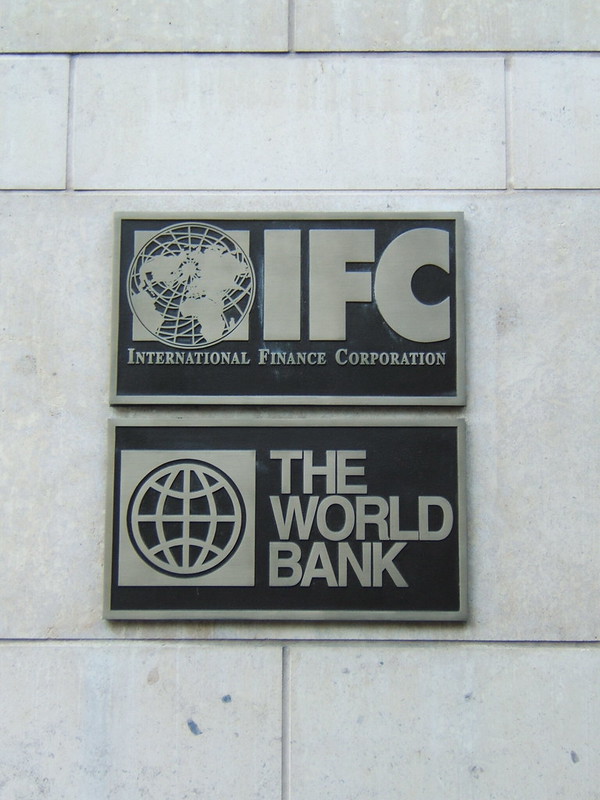World Bank Reforms Passed in COVID-19 Bill
The World Bank adopts reforms to receive funding for COVID-19 related projects.
The World Bank adopts reforms to receive funding for COVID-19 related projects.The following article was published in the May-June 2020 issue of NewsNotes.
The CARES (Coronavirus Aid, Relief, and Economic Security) Act, a nearly $500 billion emergency economic stimulus package signed into law on March 27, includes funding to the World Bank for COVID-19-related development projects, contingent on reforms to increase transparency, democratic participation, and accountability in World Bank investments and equality in several World Bank initiatives. Civil society organizations, including the Maryknoll Office for Global Concerns, have long called for these reforms and are hopeful that they will protect and promote the welfare of communities the World Bank is meant to serve.
One critical reform requires the World Bank’s private investment arm – the International Finance Corporation (IFC) – to disclose basic information for their projects funded via “financial intermediaries.” According to Inclusive Development International, an organization that investigates the opaque financing behind development projects that harm local communities, the IFC “funneled $50 billion into financial intermediaries such as commercial banks, private equity funds, and hedge funds between 2010 and 2015. That’s more than three times what the rest of the World Bank Group invested in education, and 50 percent more than it did in health care.”
In the past, the MOGC has engaged in advocacy on behalf of communities which have experienced human rights violations and displacement due to projects financed by the IFC through financial intermediaries, including the Santa Rita Dam in Guatemala that displaced 160 families in 2014.
The Act also compels the IFC to disclose and limit how much money corporations can access from the International Development Assistance program, a World Bank fund designated to help the most impoverished countries. Until recently, the IFC had not made public the names of private companies receiving its funds and the amounts awarded.
To increase accountability, the IFC has agreed to initiate a transparent review of its Compliance Advisory Ombudsman office, an independent agency that evaluates claims against the IFC from groups affected negatively by its projects. In the past, this agency has made important decisions to deliver justice for local communities.
The Inspection Panel is a similar office within the World Bank. It was reviewed last year in an opaque manner. Some civil society organizations are concerned that the Ombudsman office will be weakened after its evaluation, especially if it is nontransparent. Hopefully, this reform will allow civil society to have more input.
The new reforms also require the IFC to stop funding private education in developing countries, something it has done for 25 years. Civil society organizations have made significant complaints for years about private education systems in developing countries which disadvantage impoverished families, girls, and those who are disabled.
The Bridge Academies in Kenya are an example of a problematic private education organization funded by the IFC. In 2018, the East African Centre for Human Rights, eight families of students, and current and former teachers filed a complaint to the IFC regarding their support of the Bridge Academics. The complainants allege that the Bridge Academies failed to properly register their schools or adhere to Kenya’s education standards for academics and teacher training, and that the schools charged exorbitant fees for impoverished families. They also allege that students with disabilities were not admitted, that teachers were forced to work long hours with low wages, and that the company attempted to silence critics through lawsuits.
Father Frank Breen, MM, a missioner in Kenya for nearly 30 years, witnessed some of the problems in the Kenyan education system. “These [academies] are basically rip-offs,” Fr. Breen said, “enabling owners of the schools to make profits by paying teachers extremely low salaries and not facilitating true education in the schools. Even now, as it is, with the government subsidizing government schools, most Kenyans cannot afford to pay for education. Education is just too expensive for developing countries, yet essential for their further development. It is an absurd mistake for the World Bank to promote private schools rather than improving public education in Africa.”
The reforms also instruct the World Bank to audit the IFC’s current investments in Myanmar and establish enhanced human rights oversight, especially for its riskiest investments in the war-torn Southeast Asian country. Such oversight includes ensuring that none of IFC’s investments benefit the military in Myanmar, given their involvement in gross human rights violations in recent years.
On the whole, civil society organizations welcome these long sought-after reforms. The Bank Information Center said in a statement the reforms “will undoubtedly have a ripple effect across the development finance landscape.”
Photo: IFC/World Bank plaque on the side of their headquarters in Washington, D.C. by Flickr/Addy Cameron-Huff, license CC BY 2.0.

